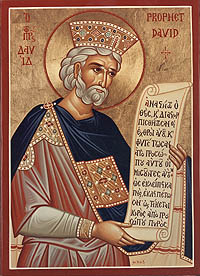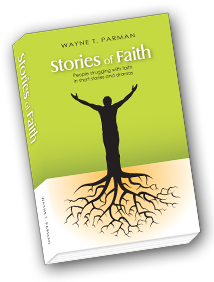 Blessed King, Suffering Man
Blessed King, Suffering Man
A play about King David’s rapid rise to power, love affair with Bathsheba, and killing of her husband Uriah. David’s story of faith leads him to admit his sin to God and worry that his children squabble over replacing him as king.
Blessed by God as the greatest king of Israel, David was young, handsome, smart, brave, and charismatic. He proclaimed his faith in God publicly. The chief priests and ruling judges of the scattered twelve tribes believed they could save Israel from invaders only by being led by a king. By defeating Goliath and the Philistines, David convinced Israel he was their best and bravest warrior. He nearly threw away his revered place by falling in love with the beautiful Bathsheba and arranging to have her husband killed in battle. His children quarreled about who would succeed him and one tried to kill him. This story of faith tells how David’s faith in God was tested and how he pleaded with the Lord for forgiveness.
An Excerpt…
A scene in which David pretends to be surprised when his chief priest Nathan accuses him of sending Bathsheba’s husband Uriah to die in battle:
DAVID: Why did you go so near the city during the fight? You must have known you would be struckdown from the wall. Remember who killed Abimelech? A woman threw a stone from the wall of Thebez and killed him. Why did you go near the wall? What was Joab thinking?
MESSENGER: Sire, we pushed the enemy back to the city gate after they attacked us with archers. As they retreated, the archers went to the wall and fired on us again. Some of your majesty’s men were felled. Your servant Urah the Hittite is dead.
DAVID: No! He was just here. Nathan, do you remember… last week?
NATHAN: (Not sure of his response, but suspicious) Um… yes, sire. He came… to see you.
DAVID: Yes, and Joab and I drank wine with him as he told us the battle plans. This is shocking. We must inform Bathsheba. She will be heartbroken.
NATHAN: Yes, sire. It will be surprising news for her, I believe.
ABSALOM: Yes, interesting. Uriah had to choose between his king and his wife.
DAVID: (Sharply) What do you mean, Absalom?
ABSALOM: Saul made Jonathan choose: you or his father. You made Uriah choose: his wife or your orders.
DAVID: I don’t understand. What are you saying?
ABSALOM: It is not important, father. My eyes have seen something I do not understand.
DAVID: (Turning to Nathan) Nathan, funeral plans are needed. Discuss them with Joab.
A LIAR EXPOSED
(Nine months later at night in David’s court. Nathan enters as David finishes signing some letters).
DAVID: Ah, Nathan. The servant said you wanted to see me. What is it?
NATHAN: I have a story to tell you, your majesty.
DAVID: Good. I like stories. Please begin.
NATHAN: (Approaching David as he tells the story) In a certain town lived a rich man and a poor man. The rich man had large flocks and herds; the poor man, nothing except one little ewe lamb. He raised it and it grew up in his home with his children. It shared his food, drank from his cup, and nestled in his arms. One day a traveler came to the rich man’s house. The wealthy man was too mean to take something from his own flock to serve this guest. So, he took the poor man’s lamb and served it.
DAVID: (Angrily) As the Lord lives, the man who did this deserves to die! He shall pay for the lamb four
times over! (Pausing) Why are you looking me that way?
NATHAN: (Jabbing David in the chest) You are the man! This is the word of the Lord: “I anointed you king over Israel and gave you wives and a family. I gave you the daughters Israel and Judah. Why have you flouted the Lord’s word by doing what is evil? You have struck down Uriah the Hittite with the sword: murdered him. Now that you have taken his wife to be your own, your family will never rest from the sword. What you did was in secret, but I shall do this in broad daylight for all Israel to see.”
DAVID: (Pale and shaking) Nathan… I-I have sinned.
NATHAN: Your confession will not save you from Yahweh’s anger. You must face another consequence: you will not die, but shall live to see some of your children die and your family torn by the sword.

